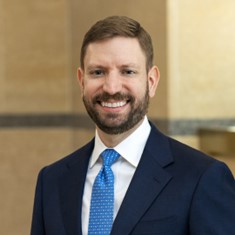Speaker

|
Michael E. Kenneally
Partner
Morgan Lewis, LLP
Connect Online with this Speaker
|
Michael E. Kenneally is co-leader of the firm’s appellate litigation practice. He helps clients tackle complex legal issues on appeal and throughout all stages of a case, drawing on deep experience across many federal and state courts. Clients often turn to Michael when they face high-stakes litigation or novel questions of constitutional, statutory, and administrative law. Before joining Morgan Lewis, Michael clerked for Justice Antonin Scalia and Justice Samuel A. Alito, Jr. at the Supreme Court of the United States and for then-Judge Neil M. Gorsuch at the US Court of Appeals for the Tenth Circuit.
Michael regularly defends clients in class action litigation, especially in employment and securities disputes. He has particular experience with lawsuits under the Employee Retirement Income Security Act of 1974 (ERISA), frequently giving presentations on the US Supreme Court’s ERISA docket, and with litigation over the enforceability of arbitration agreements and arbitration awards under the Federal Arbitration Act (FAA). Michael also represents companies in litigation connected to administrative agency proceedings, including appeals from rulings by such agencies as the National Labor Relations Board (NLRB), the US Department of Labor (DOL), and the US Nuclear Regulatory Commission (NRC). And he helps businesses develop creative strategies to challenge unlawful agency regulations and administrative procedures. A seasoned oral advocate, Michael is trusted by Fortune 500 companies, trade associations, and others to argue critical motions and appeals. Michael is equally dedicated to the craft of legal writing and regularly authors amicus curiae briefs on issues of concern to the business community as well as pro bono clients. Beyond his legal practice, Michael co-teaches a course on statutory interpretation at the Catholic University of America Columbus School of Law and has published articles on topics in copyright law. Intellectual property issues have been a fixture of Michael’s academic writing, including in his Ph.D. dissertation at Harvard University.
